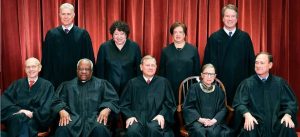by Daveda Gruber:
A few rather prominent Democratic Senators have sent a warning to the Supreme Court that it could face restructuring.
The SCOTUS got a message that was in the terms of a warning that was delivered as part of a brief that was filed on Monday to heal the court or face restructuring.
The brief was related to a New York City gun law.
Senators Sheldon Whitehouse, D-R.I., Richard Blumenthal, D-Conn., Mazie Hirono, D-Hawaii, Richard Durbin, D-Ill., and Kirsten Gillibrand, D-N.Y., brought up rulings by the court’s conservative majority. They implied that the problem must be remedied.
The brief states, “The Supreme Court is not well. And the people know it. Perhaps the Court can heal itself before the public demands it be ‘restructured in order to reduce the influence of politics.”
“Court packing” is a term that is widely used. A president who is picking judges, can in fact, change the way the court rules by picking justices who’s political status is preferred.
For this reason, the 2020 Democratic candidates have shown that they would be open to changing the number of justices on the Supreme Court.
In favor of this option are:
Former Representative Beto O’Rourke of Texas
Senator Cory Booker of New Jersey
Senator Elizabeth Warren of Massachusetts
Senator Kamala Harris of California
Senator Kirsten Gillibrand of New York
Mayor of Pete Buttigieg of South Bend, Ind., proposed a plan to expand the court by have some justices appointed by the president and others selected by the other justices in order to “depoliticize” the court.
Former Vice President Joe Biden has said that he is against court-packing.
Senator Bernie Sanders of Vermont has suggested rotating judges to other courts.
The brief in question that the Democrat senators have filed was in the case of New York State Rifle & Pistol Association, Inc. v. City of New York, which dealt with legal limitations on where gun owners could transport their licensed, locked, and unloaded firearms.
New York City recently changed the law to ease restrictions. Now would be the time to get the conservative majority in the SCOTUS to rule in favor of gun owners.
The Democratic senators are urging the court to stay out of the case brought by the NRA-backed group. But if the court still decides to hear the case, a ruling against New York City could prevent other cities and states from passing similar gun control laws.
The entire brief can be seen here:
The Supreme Court has, at this time, five Conservative judges and four Liberal judges. We can thank President Trump for that.
If the numbers change under a Democrat president, the scales would never tilt in our favor.
If the judges are rotated, I’m not sure what that would bring, but it would not be consistent, that’s for sure.
Personally I’d like to see Trump get one or two more judges, who he has picked, onto the highest court in the land.




